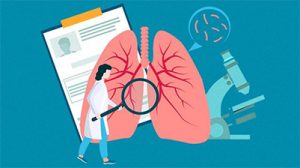Understanding Lung Cancer in Seniors: Symptoms, Types, and Treatment Steps
Lung cancer is a significant health concern for seniors, with specific symptoms and treatment approaches depending on the type, such as small cell lung cancer. Early detection and understanding of the treatment process are crucial for better outcomes.

Seniors Lung Cancer Symptoms
Lung cancer symptoms in seniors may differ slightly due to age-related factors. Common symptoms include:
- Persistent cough: Often one of the earliest signs, especially if it worsens over time.
- Shortness of breath: Difficulty breathing or wheezing, which might be mistaken for aging-related issues.
- Chest pain: Discomfort or pain in the chest, often exacerbated by deep breathing or coughing.
- Unexplained weight loss: Significant weight loss without trying can indicate a serious health issue.
- Fatigue: Persistent tiredness that doesn’t improve with rest.
These symptoms may be subtle in seniors, and they often go unrecognized or are attributed to other conditions, delaying diagnosis.
Small Cell Lung Cancer: An Overview
Small cell lung cancer (SCLC) is a fast-growing form of lung cancer that is often linked to smoking. It tends to spread quickly, making early detection and treatment essential. SCLC accounts for about 10-15% of all lung cancers and is typically more aggressive than non-small cell lung cancer (NSCLC).
Key characteristics of SCLC include:
- Rapid growth: SCLC cells multiply quickly, leading to more aggressive disease progression.
- Early spread: SCLC often metastasizes to other parts of the body early in its development.
- Treatment sensitivity: While SCLC responds well to chemotherapy and radiation initially, it often recurs.
Steps in Diagnosing and Treating Lung Cancer
The process of diagnosing and treating lung cancer involves several critical steps. Understanding these can help patients and their families navigate the healthcare system more effectively.
Step 1: Initial Evaluation
- Symptoms Review: Doctors assess symptoms, especially persistent ones like coughing, chest pain, and weight loss.
- Medical History: A detailed history, including smoking habits and exposure to carcinogens, is taken.
Step 2: Diagnostic Testing
- Imaging Tests: Chest X-rays, CT scans, and PET scans help visualize the tumor and assess its spread.
- Biopsy: A tissue sample is taken to confirm the presence of cancer cells and determine the type.
Step 3: Staging
- Staging Tests: Determining the stage of cancer (from I to IV) helps guide treatment options.
- Metastasis Check: Tests are done to see if cancer has spread to other organs.
Step 4: Treatment Planning
- Multidisciplinary Team: Oncologists, radiologists, and surgeons collaborate to develop a treatment plan.
- Patient Input: The patient’s preferences and overall health are considered in the plan.
Step 5: Treatment Implementation
- Surgery: Removal of the tumor may be an option in early-stage lung cancer.
- Radiation Therapy: Used to kill cancer cells and shrink tumors, often in conjunction with other treatments.
- Chemotherapy: Systemic treatment to destroy rapidly dividing cancer cells, particularly in SCLC.
- Targeted Therapy: Drugs designed to target specific cancer cell mechanisms.
- Immunotherapy: Helps the body’s immune system fight cancer more effectively.
Step 6: Follow-Up and Monitoring
- Regular Check-Ups: Ongoing monitoring to detect any recurrence or progression.
- Supportive Care: Managing symptoms and maintaining quality of life.
Bullet Points: Key Facts About Lung Cancer Treatment
- Surgery is often effective in early stages but may not be suitable for all seniors.
- Chemotherapy is commonly used for small cell lung cancer due to its rapid spread.
- Radiation therapy can be used alone or in combination with other treatments.
- Targeted therapy is a newer approach, effective in specific genetic profiles.
- Immunotherapy is increasingly used, especially in advanced lung cancer.
Q&A Section: Common Questions About Lung Cancer in Seniors
Q1: What are the specific challenges of treating lung cancer in seniors?
A1: Seniors often have other health conditions that complicate treatment, and their bodies may not tolerate aggressive treatments as well as younger patients.
Q2: Can lung cancer be cured in seniors?
A2: While a complete cure is challenging, especially in advanced stages, treatments can significantly extend life and improve quality of life.
Q3: How does smoking affect lung cancer risk in seniors?
A3: Smoking is the leading cause of lung cancer. Even seniors who quit years ago remain at elevated risk, though quitting reduces that risk over time.
Q4: What are the latest advancements in lung cancer treatment?
A4: Advances include targeted therapy and immunotherapy, which are more effective and have fewer side effects than traditional chemotherapy.
Q5: How can seniors reduce their risk of lung cancer?
A5: Quitting smoking, avoiding secondhand smoke, and maintaining regular health check-ups can reduce risk.
Excel Table: Treatment Success Rates by Type
| Treatment Type | Small Cell Lung Cancer (SCLC) Success Rate | Non-Small Cell Lung Cancer (NSCLC) Success Rate | Suitability for Seniors |
|---|---|---|---|
| Surgery | Low in SCLC (10-20%) | High in early-stage NSCLC (70-90%) | Varies by overall health |
| Chemotherapy | Moderate (40-50%) | Moderate (30-40%) | Often tolerated with support |
| Radiation Therapy | Moderate (50-60%) | Moderate to high (40-70%) | Depends on location and dose |
| Targeted Therapy | High in targeted mutations (60-80%) | High in targeted mutations (70-90%) | Generally well-tolerated |
| Immunotherapy | Moderate to high (30-60%) | Moderate to high (40-60%) | Tolerated in good candidates |
Conclusion
Lung cancer in seniors requires careful management due to the interplay of age, overall health, and cancer type. Whether dealing with small cell lung cancer or another form, understanding the symptoms, treatment steps, and available therapies is crucial for improving outcomes and maintaining quality of life.
References:
- American Lung Association – Lung Cancer Symptoms
- Cancer.org – Small Cell Lung Cancer
- Mayo Clinic – Lung Cancer Treatment
This guide should provide a comprehensive overview of lung cancer in seniors, from symptoms to treatment.







Recent Comments